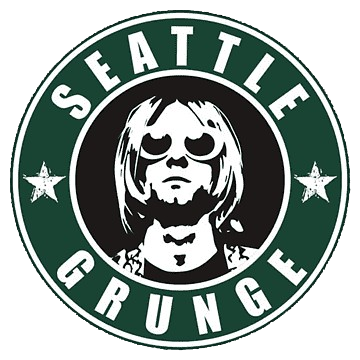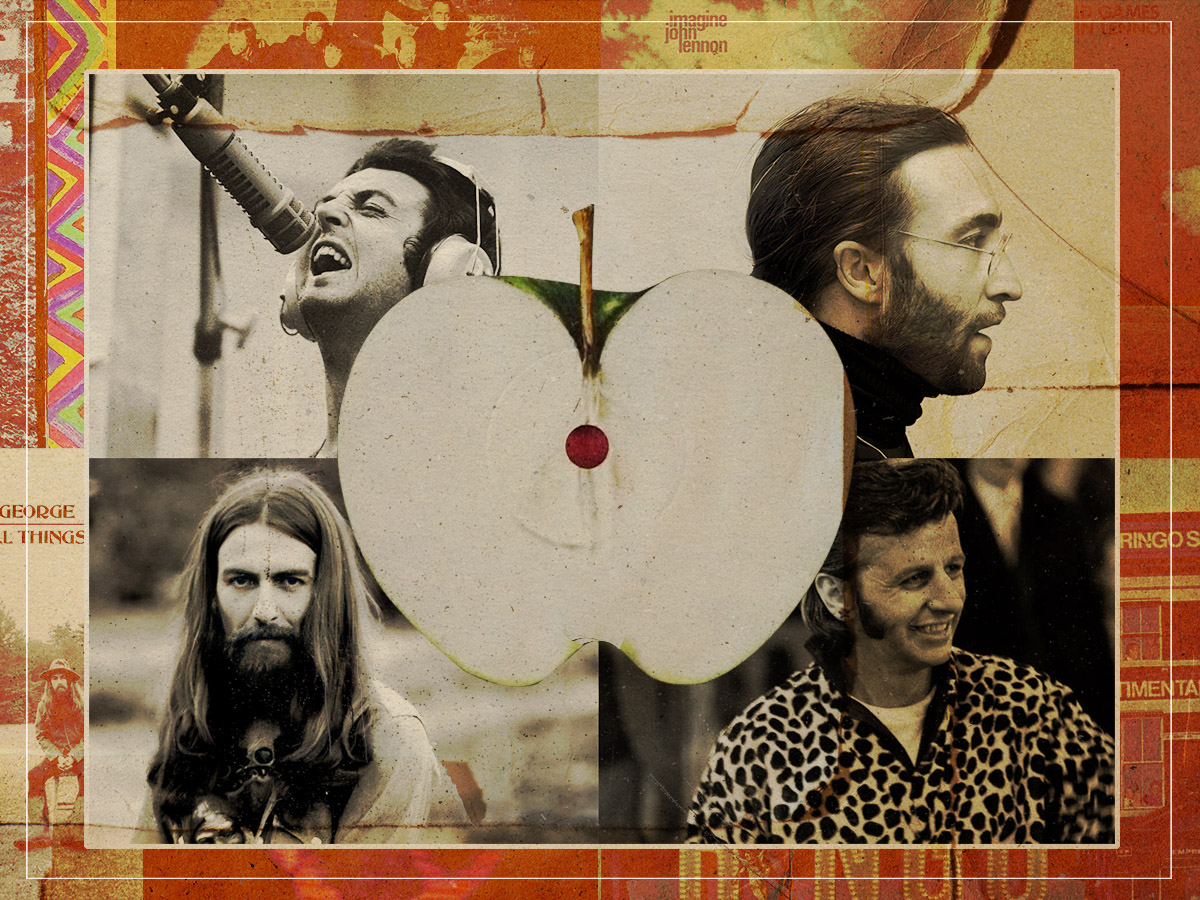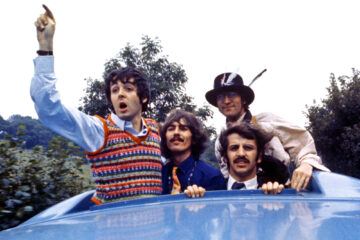It felt like a loss in the family for every Beatles the minute they found out the group wouldn’t be working together anymore. The Fab Four should have logistically gone on forever, and now, due to creative differences and horrible business dealings, we had to watch the greatest band on Earth suddenly crumble as the 1960s ended. That didn’t mean everyone stopped making music, but what if the group had decided to stay together?
It was clear that everyone just needed some time away from each other, so in this alternate timeline, what if they decided to take time to work on themselves and come back in, say, 1973? This would have given them ample time to recharge their batteries and even manage to work on solo ventures where they saw fit.
Even George Harrison endorsed this kind of idea at the time, remarking in the series Get Back that he would rather do an album on his own and then come back refreshed when it came time to release a proper Beatles album. Sadly, that never came to pass, and we’re just left to sort through those first few albums as best we can.
So, looking through the first handful of albums by each of them, I see that there’s a way for every former Beatles (yes, even Ringo) to have an excellent song on this hypothetical comeback record. Would it have kept the band together? Who knows, but it would be nice to have the camaraderie back at least a little bit on these tunes.
Crafting a mid-1970s Beatles album:
1. ‘Instant Karma’
John Lennon was the one to start the band in the first place, so it’s only fitting that the first track be one of his signature rockers. As opposed to Lennon getting up on his high horse talking about the problems with the world, his work with The Beatles was always best suited to working on personal politics. And right out of the gate in his solo career, ‘Instant Karma’ feels like it should already have the group prestamped on it.
Outside of the fact that Harrison is playing guitar on the record, this is Lennon through and through, talking about all of us shining much brighter when we learn to treat each other right. The 1960s dream may have been over by this point, but this could have been a reminder that everything wasn’t in shambles, either.
2. ‘Jet’
For everyone claiming that all Paul McCartney did was write lightweight fluff for the group, this new album should kick off with a song that puts naysayers to shame. McCartney did have his schmaltzy side, but a song like ‘My Love’ could be better if relegated to a Wings-style solo project than becoming yet another bore for the rest of the lads in the studio. As for ‘Jet’, this is the kind of rock and roll that many people had been waiting for since the days of ‘Get Back’ and ‘Helter Skelter’.
Since McCartney breaks out the Little Richard chops halfway through this song, this would have been a perfect track for him and Lennon to bring those signature vocal harmonies to the table, even play around with the melody if they felt fancy. A lot had changed since the days of the 1960s, but ‘Jet’ gets one thing straight from McCartney: The Beatles are a rock band first, and no amount of time is going to change that.
3. ‘Cold Turkey’
Then again, Lennon will never be outdone when it comes to the rockers. After all, this is the same guy who had to fight tooth and nail to ensure he did things his way when Brian Epstein first got his hands on the group. And if the (comparative) lightweight McCartney could rock, Lennon would get down to the raw sounds of himself on ‘Cold Turkey’.
Almost serving as the darker sequel to a song like ‘Lucy in the Sky With Diamonds’, hearing Lennon talk about the harmful effects of heroin withdrawal as he’s crying out in pain is both a primal precursor to heavy metal as well as one of the few times where Yoko Ono’s effect on him completely served the song. Whereas the group were used to well constructed works of art, this has all the looseness of a jam that could put them in the same conversation as the Creams of the world.
4. ‘Another Day’
A lot of McCartney’s solo catalogue tended to be almost too whimsical for its own good sometimes. As much as people loved the more lighthearted songs from Macca, there was no way that anyone in the group would have agreed to be involved in a song titled ‘Little Lamb Dragonfly’, despite it being one of the highlights of Red Rose Speedway. McCartney could tone it down when he wanted, and ‘Another Day’ is a prime example of a hit single that the group never had.
In fact, McCartney can be heard demoing the song when playing in the background of Get Back, so it’s clear that the band at least listened to the tune and may have thought enough of it to work on it had everyone been on the same page. As it stands, it’s the story of ‘Eleanor Rigby in New York’, as drummer Denny Seiwell put it, and given the time away, this could be the charming mirror to the band’s adventurous 1960s period.
5. ‘Love’
Having three years away would involve a lot of soul-searching from everyone in the group. While Lennon probably wouldn’t have lashed out at his bandmates as much in the press, chances are he would have still gone to primal therapy as a way to ease his mind from the horrible things he had pent up for a decade long. Once that was finally released, ‘Love’ was the kind of beautiful ballad that seemed to spill out of him.
Outside of Plastic Ono Band being a visceral reaction to the band’s breakup, this is Lennon taking a step away to just talk about his love for Yoko, knowing that everything will be alright and understanding what love can be to someone that had been denied it for far too long. ‘God’ is a great song, but if that was a firm stance saying The Beatles were over, ‘Love’ was saying that, despite everything they had seen, love was still all they needed.
6. ‘Don’t Let Me Wait Too Long’
How have we gone this long without mentioning George Harrison? Sure, he was known as the quiet member of the group for a reason, but there’s no denying the star power he had right out of the gate with All Things Must Pass and The Concert for Bangladesh. Both sported worthy inclusions for a list like this, but ‘Don’t Let Me Wait Too Long’ is one of the most straight-ahead pop tunes of his career.
Those lessons hearing Phil Spector’s approach in the studio definitely rubbed off on Harrison here, and hearing him bring his quasi-folk spirit to the track is a great way to get used to this version of him. The same songwriter who wrote ‘Something’ is still madly in love, but now his nerve might be getting the better of him.
7. ‘Maybe I’m Amazed’
The first side of the vinyl needed to end with a bang. This is The Beatles we’re talking about, and since ‘I Want You (She’s So Heavy)’ left people with their jaws on the floor, they needed to go big to keep everyone on their toes. Whereas Lennon’s anguished cry worked on Abbey Road, McCartney writing the love song to end all love songs on ‘Maybe I’m Amazed’ is just the right way to energise everyone.
Since the last few tunes on this hypothetical record had been downtempo, this is a way to kick things back into gear when the chorus hits, which sounds like if McCartney was trying to shred his own larynx through sheer voice halfway through the tune. The fade-out of the single that we know would have to suffice on the record, but still a great way to bring the bombast back into the conversation.
8. ‘Mother’
After flipping over the vinyl, the toll of Lennon’s ‘Mother’ is enough to wake everyone up from what they just heard. That primal therapy was bound to bring out some raw wounds, and Lennon wasn’t willing to just roll over when it came time to let it all out. Feelings demand to be felt, and if ‘Love’ was the main course, then ‘Mother’ is the bitter aftertaste from all the sugariness of the last tune.
As opposed to the soft-hearted young boy singing on ‘Julia’, Lennon is absolutely ferocious in this classic, tearing his parents a new one by telling them how little they cared for him and how wounded he’s felt as a result. If there’s one thing that defined Lennon throughout his career, it’s being brutally honest, and this is the kind of tune that could get anyone to understand the raw pain he went through.
9. ‘Behind That Locked Door’
Most of Harrison’s solo catalogue centred on one’s experience as it relates to God. While there’s nothing wrong with putting one’s faith in the middle of their music, that kind of philosophy might have been better served on All Things Must Pass than a proper Beatles album. The Fab Four were all about love, and that was already an emotion that Harrison knew all too well.
Written when working with Bob Dylan, ‘Behind That Locked Door’ is a plea for Harrison to the listener to make sure that their hearts are open to the idea of love. Since the Black Sabbaths of the world were talking about the grim realities behind humanity, this is a good way for Harrison to keep the core idea of his music in mind. It could be a song to a lover or a song to a higher power, but either way, it works like a charm.
10. ‘It Don’t Come Easy’
Keen-eyed viewers will probably realise that only one Ringo Starr tune would qualify for a list like this. The man never claimed to be a musical savant when it came to songwriting, and that wasn’t about to suddenly lead to him following in his bandmate’s footsteps as a melodic genius. He could still knock out a tune, though, and with the help of Harrison, Starr turned in ‘It Don’t Come Easy’ with all the swagger he could muster.
Starr used to be the knockabout member of the group for those few years, but the benefit of a break actually gives his solo single some degree of credibility. As opposed to the lovable goofball who loved to poke fun at himself half the time, this is that boy grown into a man and espousing his wise words to the public. The drummer behind ‘Yellow Submarine’ had done some living, and it took him a long while to sing the blues as well as this.
11. ‘Imagine’
Part of the problem with an imaginary Beatles album would be to focus on limiting them to what makes their solo careers great. The rest of the band probably didn’t want to hear McCartney’s whimsical songs, and there’s a good chance that all four of them wouldn’t be on board with Harrison’s preachy songs. Lennon could compromise when he wanted to, and ‘Imagine’ is the kind of song that manages to be political and universal at the same time.
While the tune has become more of a mission statement these days than a proper song, this kind of arrangement is aching for the rest of his mates to add their own signature touch into the mix. The stripped-back production might be what makes it great, to begin with, but to achieve true perfection, just, ahem, imagine what it would have sounded like if you put just the right guitar line in the breaks or brought back those harmonies on certain lines.
12. ‘The Back Seat of My Car’
At the end of The Beatles’ career, critics lined up to give McCartney a tongue-lashing in the press. Since he had taken the fall for breaking up the group in the first place, the fact that he was putting out artsy schlock like RAM did nothing to equal his bandmates, who were (arguably) doing more important musical ventures. Macca still cared about the music before all else, and the ending of RAM could slide into the final stretch of the 1973 album with ease.
Although Lennon had admitted to taking a liking to some pieces of ‘Uncle Albert/Admiral Halsey’, ‘The Back Seat of My Car’ is far more deserving of the proper Beatles treatment, with all of those collapsing harmonies from Paul and Linda being replaced by the singing Threetles making their response to Brian Wilson’s masterpieces. A showstopper if there ever was one, but right before the curtain falls, there’s one more track to wrap everything up with.
13. ‘All Things Must Pass’
It’s almost painful not to put more Harrison songs on a list like this. Half of All Things Must Pass could have been included as a worthy Beatles track, but the record’s ethos centring around Harrison’s frustrations within the group probably isn’t the best move. Harrison would have surely put out that long-awaited solo album during his time away, but had they gotten back together, ‘All Things Must Pass’ needed to be included somewhere in the mix.
Despite serving as a statement to the fans that The Beatles’ legacy would pass away, this 1973 version is a way for people to remember that Beatlemania wasn’t meant to last forever without changing any of the words. ‘Isn’t It A Pity’ and ‘Wah-Wah’ may actually be better songs all told, but if you’re fashioning an album that’s meant to be a reunion of the greatest musical minds of the 20th century, ‘All Things Must Pass’ leaves everything hanging in the air. They might stay together, they may not, but it’s been an adventure regardless.




